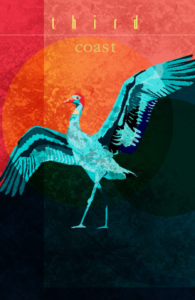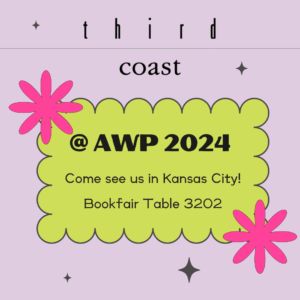Happy Spring! We are so thrilled to reveal the cover for our next issue, coming to you soon! Kudos to our talented cover artist, Ashley Miller—check out more of her work here!

Happy Spring! We are so thrilled to reveal the cover for our next issue, coming to you soon! Kudos to our talented cover artist, Ashley Miller—check out more of her work here!

March
Emiliana Renuart
The drumming is back. Slow. Measured. Long
pauses. From behind the azaleas, neon and fervent
as they are. They are zealous, dedicated so to living.
Am I zealous like that? About living, yes, I think so.
About flowers, yes. About strange drumming, from
beyond the sightline, which stirs in me some wild
urge for sound and impact. And my home is here
now? We are barefoot for the first time and we are
watching the doves with the bleeding hearts hop
around and everywhere the world is ruined and
everywhere it is perfect. Please. Let me be surprised.
Emiliana Renuart lives in St. Louis, Missouri. She is originally from
Michigan, where she attended Kalamazoo College and worked with and
advocated for young readers and writers.
Hello Third Coast Readers! I hope you are enjoying this busy month of renewal, which appears to be halfway over already. Despite the perpetually quickening pace of life, this swift passage of time has not caused us to forget the acknowledgment of International Women’s Day, celebrated on March 8th. Last week, gratitude was expressed to countless mothers, friends, sisters, and significant others for their contribution to the lives of so many.
As a brief history lesson in itself, Women’s History Month was officially established in 1980. The first march in Washington D.C. for women’s suffrage occurred in March of 1913, and in March 1917 the National Women’s Party was formed. March contains the birthdays of women such as Ruth Bader Ginsburg, Flannery O’Connor, and Simone Biles. Women are increasingly being awarded Oscars and Billboard awards, which both have ceremonies in March. In addition, I find it fitting that March contains the first day of Spring, and aside from the cliché association between women and birth, there is something about a woman that brings life to whatever environment surrounds her.
Throughout history, women have worn many hats. We are mothers, friends, sisters, and significant others. We have careers and hobbies. No matter what life circumstances we find ourselves in, it is easy to feel fractured by the variety of spaces that we exist in. In honor of Women’s History Month and the incredible achievements that we accomplish daily, whether big or small, collectively or individually, I chose to share Mónica Gomery’s poem, “The Poet Considers If Her Body Belongs to Her,” from Issue 51. It serves as a reminder of the many spaces we occupy, the power of autonomy, and the importance of taking care of ourselves in the midst of our daily responsibilities. To quote Michelle Obama, “Here’s to strong women: may we know them, may we be them, may we raise them.”
— Logen Crandall, Editorial Intern
The Poet Considers If Her Body Belongs to Her
By Mónica Gomery
In the mirror some edges taper off
into light, light-filled sound. Here
are great waves of breath riding into
and leaving the body. Doors spin
on their built-in revolvers, the opens
and shuts of you. Take a breath.
Everyone cycles through.
Mostly the body is exits, arrivals.
Mostly on-ramps, back doors, trap
doors, fire escapes. Red carpets
rolled out on sternum and tongue.
Mostly mailboxes, runways, trade port
and train station. Skin cells stacking
for decades like bricks into doorways
and archways, gateways and courtyards.
The body may be less like a house
and more like an airport––
organ of transit, fluorescent
at dawn. An airport, no matter
the hour, is a churning.
In the mirror breath stills the filled body
but it is not only breath that enters
and leaves. It is dust, streetlights
and rages. Secrets and weather. Voices
of metal and earth, other names, other people
altogether, arrive and depart, land and take off.
How many brutal and generous citizens,
tourists of the body, built this coming
and going thing of clutter and silence––
every scrap, every linoleum tile
belonging to all of its architects, all
of its authors. How many travelers,
cellists sliding wheeled
instruments down lit corridors,
belonging to no one
or everyone, belonging to
anyone who has laid a hand
at her edge.
Mónica Gomery is a rabbi and poet. Her work explores queerness, diaspora, ancestry, theology, and cultivating courageous hearts. Mónica serves as Rabbi and Music Director at Kol Tzedek Synagogue and on the faculty of SVARA: A Traditionally Radical Yeshiva. She is also a co-founder of Let My People Sing! With the writer Moriel Zecher-Rothman she currently hosts the 5-3-5 poetry salon in Philadelphia. She is grateful to work with incredible teams of people on these projects committed to intergenerational healing and cultural, political, and spiritual transformation. More information about Mónica and her achievements can be found here.
Michael Mlekoday lives in the Putah Creek watershed of California, teaching classes on hip-hop, Gothic literature, and wilderness poetics. A National Poetry Slam Champion, Mlekoday co-founded Button Publishing and currently serves as Poetry Editor of Ruminate Magazine and Editor of The Lichening (coming soon!). They curate a weekly newsletter of cool poems called Dredge. More information about Mlekoday can be found here.
Hello Third Coast Community and Happy Friday! Today we find ourselves in the middle of February and meditating on post-Valentine’s Day warmth. In addition to being a commercial holiday, did you know that the 14th is also the birthday of the great Frederick Douglass?
As we glow in appreciation for those we care about, it is just as important to reflect on the literary activism of Douglass and his successors. Third Coast strives to uplift the voices of creatives within the Black community, so today we will revisit Kara Jackson’s poem “lost & found” from Issue 48. The month of February serves as a reminder of the excellence that has emerged from inestimable hardship and courage, but also the distance that remains between where we are now and a world without systemic racism.
— Logen Crandall, Editorial Intern
—
lost & found
By Kara Jackson
i thought i left my black in a safe
place i thought my black pulled on me
an umbilical cord, thought my black was cut
for safekeeping i thought my black was floating
in a jar or maybe my black is a button
i’m supposed to rush to in case of emergency
i take my black off of my shoulders and hang it up
my father only mentions his black if he’s drunk
my black is something we claim
on our taxes, the very high ones, my friends
they come to visit and ask me how i’ve gotten on
without it, ask do i miss my black?
like a childhood pet i tell them it’s around
here somewhere, dust assigned to some crevice,
sock in the lost & found i ask my neighbors
if they’ve seen my black and they call me
a nigger
how did they find it so quickly?
like a bird heard and recognized
Kara Jackson is the daughter of country folks. She is the author of Bloodstone Cowboy (Haymarket Books, 2019). Jackson served as the third National Youth Poet Laureate from 2019-2020. Jackson made her musical debut with her EP A Song for Every Chamber of the Heart, which was self-released. Through a multidisciplinary approach, Jackson attempts to document her lineage in a country that demands its erasure. Her work has appeared in POETRY, Frontier Poetry, Rookie Mag, Nimrod Literary Journal, The Lily, and Saint Heron. Jackson is a TEDx speaker. She is a junior at Smith College. (From The Spoken Word Club)

Members of the Third Coast team will be traveling to Kansas City, Missouri next week for the annual AWP Conference & Bookfair!
The Association of Writers & Writing Programs Conference (AWP) consists of those who claim all kinds of professions and passions within the writing world, from ambitious students to established publishers. From February 7th-10th, thousands of creatives within the writing community will gather in Kansas City to attend events, spark meaningful conversations, and view the hundreds of bookfair exhibitors!
We would love to meet former contributors and new writers, so if you are attending the conference or happen to live in the area you can find us at Table 3202 during the bookfair. We’ll have journals for sale and free merch, including branded pens, postcards, bookmarks, and stickers.
Click here for more information about AWP and the upcoming conference.
We hope to see you there!
— Logen Crandall, Editorial Intern
by Julie E. Bloemeke
–Henri Rousseau, Cleveland Museum of Art
I do not wish for people today, sweating
before this fantastical jungle, lush with lies:
two species usually separated by continents,
now prowling a veined green landscape
the artist finished while arrested for fraud.
Can you find the tiger? Her question punctures
the gallery of my brooding. A school tour
of whispers follow. All these months
I’ve lived with a truth
that lied itself: there was no one but you.
Still, something in me wishes to scream
it, to blurt Rousseau, to call out this cat
caught in the kill. I am comb tangled
in the odd parted tiger hair, the unsettling
human eyes of this hunter victor, reveling
under a clutch of more wrong: bananas
do not grow top down. Oranges don’t section
through skin. The true answer is one I starve
to reveal. Do you see the tiger? she asks again.
I want to say, the fangs are not mine, but they are
exactly me, unencumbered for the feed.
Does she know the blood run of all I once thought
I was is seeping from me, pooling on the floor?
That any carnivore would lick to be so fed
by my craving? Another reality blinks
from the point of severed plant.
What if I am both the orange and the flower
above it, just as I was when I puked
from nerves this morning, or last night
when I dropped marinated cherries
over the balcony because my curiosity
for destruction ran so deep? I want to tell
it, to say the flower is most brutal of all:
look how it witnesses this suffocating death
and does nothing but bloom beautiful–
an oblivious sun burning among
the created jungle, tearing a wound
through the blue lie of sky
just by a slight turn of her petals.
Julie E. Bloemeke (she/her/hers) is the 2021 Georgia Author of the Year Finalist for Poetry. Her debut full-length collection Slide to Unlock (Sibling Rivalry Press, 2020) was also chosen as a 2021 Book All Georgians Should Read, one of only two poetry collections selected statewide for the honor. Currently an associate editor for South Carolina Review, she also recently served as co-editor for the Dolly Parton tribute issue of Limp Wrist and was a finalist for the Telluride Institute’s 2020 Fischer Prize. Her poems, essays, and interviews have appeared in numerous publications including Writer’s Chronicle, Prairie Schooner, Cortland Review, Gulf Coast, EcoTheo Review, South Dakota Review, and others. A 2021 fellow at the Virginia Center for the Creative Arts, she teaches online workshops and is a freelance writer, editor, and guest lecturer. To learn more: https://www.jebloemeke.com